HOW TO ESTIMATE LIMITS FROM GRAPHS
Subscribe to our ▶️ YouTube channel 🔴 for the latest videos, updates, and tips.
Required Condition for Existence of Limit of Function
lim x->x0 f(x) = L exists if the following hold :
(i) lim x->x0+ f(x) exists,
(ii) lim x->x0- f(x) exists, and
(iii) lim x->x0+ f(x) = lim x->x0- f(x) = L
How can we say the function is not exists by looking at its graph ?
When we get different values as x0 approaches from left and from right, we may say that the function does not exists.
Question 1 :
Use the graph to find the limits (if it exists). If the limit does not exist, explain why?
lim x->2 f(x)
Where f(x) = 4 - x x ≠ 2
0 x = 2
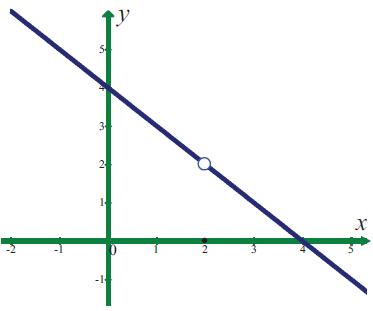
Solution :
To find the value of left hand limit and right hand limit for x -> 2, we have to use the function f(x) = 4 - x. It is enough to check if we get equal values for left hand and right hand limit.
|
f(x) = 4 - x lim x->2- f(x) = 4 - 2 = 2 |
f(x) = (4 - x) lim x->2+ f(x) = 4 - 2 = 2 |
f(x) = 0 at x = 2
lim x->2- f(x) = lim x->2+ f(x)
Hence the required limit 2.
Question 2 :
Use the graph to find the limits (if it exists). If the limit does not exist, explain why?
lim x->1 f(x)
Where f(x) = x2 + 2 x ≠ 1
= 1 x = 1
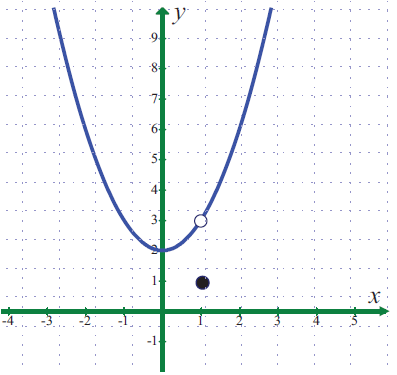
Solution :
To find the value of left hand limit and right hand limit for x -> 1, we have to use the function f(x) = (x2 + 2). It is enough to check if we get equal values for left hand and right hand limit.
|
f(x) = (x2 + 2) lim x->1- f(x) = 12 + 2 = 3 |
f(x) = (x2 + 2) lim x->1+ f(x) = 12 + 2 = 3 |
lim x->1- f(x) = lim x->1+ f(x)
Hence the required limit is 3.
Question 3 :
Use the graph to find the limits (if it exists). If the limit does not exist, explain why?
lim x->3 1/(x- 3)
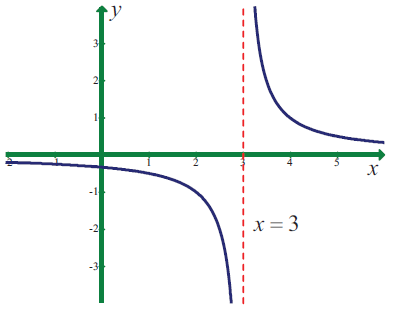
Solution :
From the graph given above, we get different values for left hand limit and right hand limit.
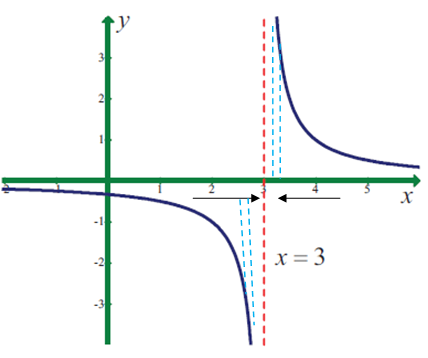
The function does not exist at x - >3.
Question 4 :
Use the graph to find the limits (if it exists). If the limit does not exist, explain why?
lim x->5 |x - 5|/(x - 5)
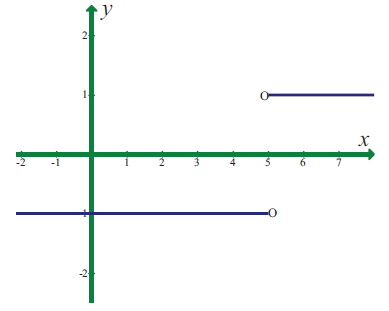
Solution :
From the graph given above, we get different values for left hand limit and right hand limit.
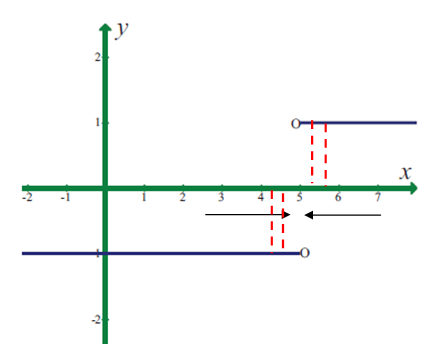
The function does not exist at x - >5.
Subscribe to our ▶️ YouTube channel 🔴 for the latest videos, updates, and tips.
Kindly mail your feedback to v4formath@gmail.com
We always appreciate your feedback.
About Us | Contact Us | Privacy Policy
©All rights reserved. onlinemath4all.com

Recent Articles
-
Digital SAT Math Problems and Solutions (Part - 1)
Feb 05, 26 09:37 AM
Digital SAT Math Problems and Solutions (Part - 1) -
AP Precalculus Problems and Solutions
Feb 05, 26 06:41 AM
AP Precalculus Problems and Solutions -
SAT Math Preparation with Hard Questions
Feb 05, 26 05:30 AM
SAT Math Preparation with Hard Questions

